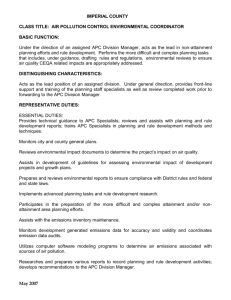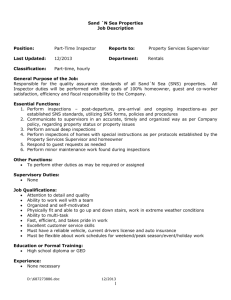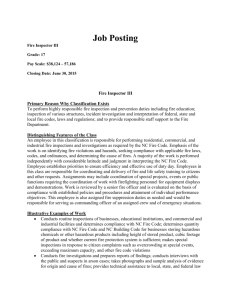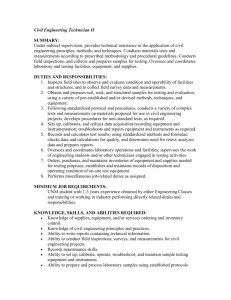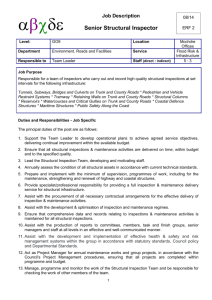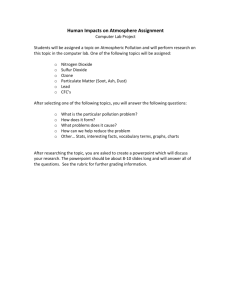Air Pollution Control Inspector III
advertisement
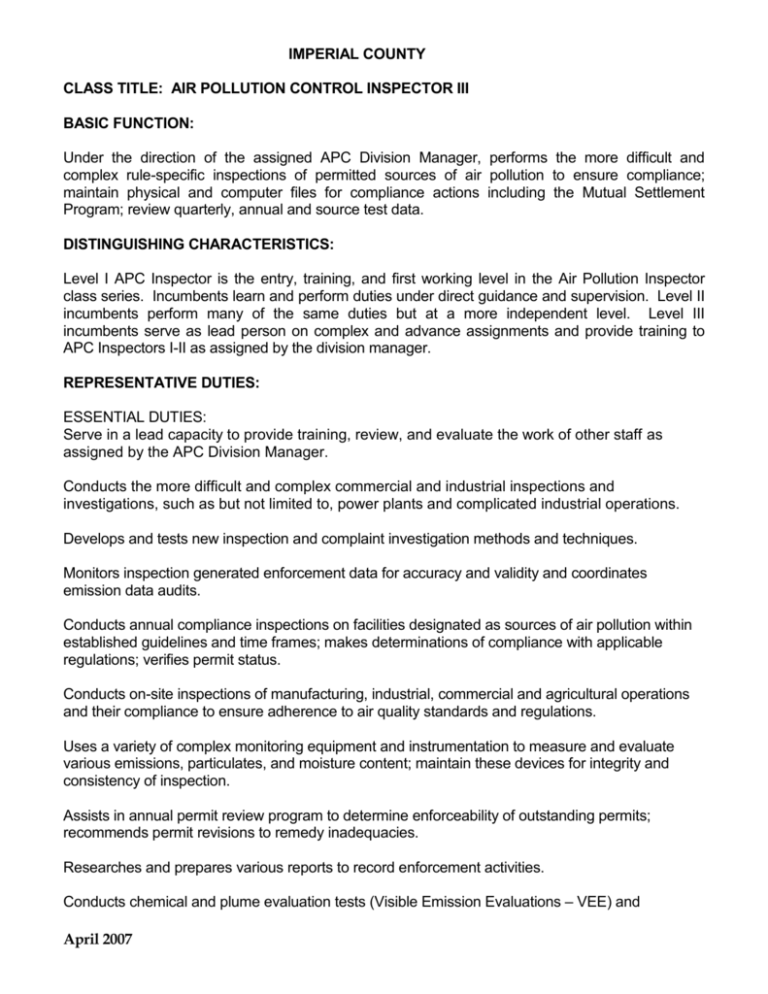
IMPERIAL COUNTY CLASS TITLE: AIR POLLUTION CONTROL INSPECTOR III BASIC FUNCTION: Under the direction of the assigned APC Division Manager, performs the more difficult and complex rule-specific inspections of permitted sources of air pollution to ensure compliance; maintain physical and computer files for compliance actions including the Mutual Settlement Program; review quarterly, annual and source test data. DISTINGUISHING CHARACTERISTICS: Level I APC Inspector is the entry, training, and first working level in the Air Pollution Inspector class series. Incumbents learn and perform duties under direct guidance and supervision. Level II incumbents perform many of the same duties but at a more independent level. Level III incumbents serve as lead person on complex and advance assignments and provide training to APC Inspectors I-II as assigned by the division manager. REPRESENTATIVE DUTIES: ESSENTIAL DUTIES: Serve in a lead capacity to provide training, review, and evaluate the work of other staff as assigned by the APC Division Manager. Conducts the more difficult and complex commercial and industrial inspections and investigations, such as but not limited to, power plants and complicated industrial operations. Develops and tests new inspection and complaint investigation methods and techniques. Monitors inspection generated enforcement data for accuracy and validity and coordinates emission data audits. Conducts annual compliance inspections on facilities designated as sources of air pollution within established guidelines and time frames; makes determinations of compliance with applicable regulations; verifies permit status. Conducts on-site inspections of manufacturing, industrial, commercial and agricultural operations and their compliance to ensure adherence to air quality standards and regulations. Uses a variety of complex monitoring equipment and instrumentation to measure and evaluate various emissions, particulates, and moisture content; maintain these devices for integrity and consistency of inspection. Assists in annual permit review program to determine enforceability of outstanding permits; recommends permit revisions to remedy inadequacies. Researches and prepares various reports to record enforcement activities. Conducts chemical and plume evaluation tests (Visible Emission Evaluations – VEE) and April 2007 Air Pollution Control Inspector III - Continued Page 2 records findings; takes photographs for documentation at inspection sites. Responds and investigates complaints by citizens of air pollution problems; determines nature and extent of problem; prepares documentation of findings; consults with citizens on status of complaint. Issues Notices of Violation and Notices to Comply to sources found in violation of compliance; prepares necessary documentation for notices report. Observe source tests and review the resulting data to determine air emissions for various pollution sources and determine compliance with air quality standards. Attend visible emissions training to be certified to visually read opacity limitations; attend staff meetings with other departments concerning APC activities. Operate a microcomputer and other office equipment. Provide information and assistance to businesses and public regarding APCD regulations and requirements. OTHER DUTIES: Perform related duties as assigned. KNOWLEDGE AND ABILITIES: KNOWLEDGE OF: Techniques and methods of environmental investigations. Principles and practices of air quality inspection and enforcement. Applicable District, state and federal laws, rules, regulations and policies. Principles and practices of training, planning, and assignment review. Project management techniques. Common biological, chemical, and physical processes that cause air pollution and their long and short term impacts and effects. Principles and practices of record keeping and report writing. Department and program objectives and goals. Interpersonal skills using tact, patience, and courtesy. ABILITY TO: Plan and conduct difficult and complex air quality inspections, investigations, and audits. Train, review, and evaluate the work of others as assigned in compliance inspections and procedures; assist in professional development. Analyze technical air pollution problems, evaluate alternative solutions, and develop effective recommendations. Communicate effectively both orally and in writing. Prepare clear and concise reports, correspondence and other written materials. Exercise initiative and sound independent judgment within established guidelines. Establish and maintain effective working relationships with those contacted in course of work. Read, interpret, apply and explain rules, regulations, policies and procedures. April 2007 Air Pollution Control Inspector III - Continued Page 3 Maintain current knowledge of program rules, regulations, requirements and restrictions. Work independently with little direction. Perform in stressful or confrontational situations. Demonstrate tact and diplomacy. Plan and organize work. Meet schedules and time lines. Maintain records and prepare reports. EDUCATION AND EXPERIENCE: Any combination equivalent to: Bachelor’s Degree from a four year college or university or an Associate’s Degree from an accredited college and two years experience at the level of an APC Inspector II or equivalent. LICENSES AND OTHER REQUIREMENTS: Valid California driver’s license; Must possess or be able to obtain a State of California Visible Emissions Evaluation Certificate (VEE); State of California Fundamentals of Enforcement Certificate, Uniform Air Quality Certificate, Enforcement Cross Media Training Certificate and HAZWOPER Training Certificate. WORKING CONDITIONS: Indoor and outdoor environments; subject to driving a vehicle to conduct work. Physical abilities required include seeing to drive a vehicle, dexterity of hands and fingers to operate tools and equipment, lifting and carrying up to 70 pounds, pulling and pushing heavy objects, climbing stairs and ladders to change monitoring filters and witness source tests, working in cramped or restrictive work space, working and balancing at heights, standing for extended periods of time, hearing and speaking to exchange information. Incumbents may be exposed to gasoline and diesel fumes, hazardous materials, pesticides, dust, pollen, and extreme weather conditions. April 2007
